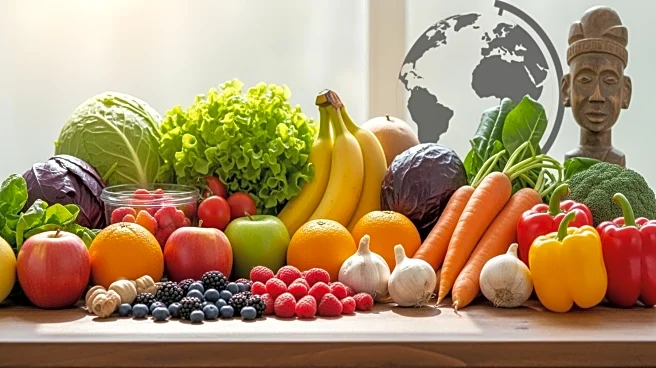What's Happening?
In celebration of World Food Day, the Federal Government of Nigeria has partnered with international organizations and private stakeholders to promote inclusive agribusiness growth. The initiative aims
to accelerate agricultural development and enhance food security across the country. The Minister of State for Agriculture and Food Security, Sen. Aliyu Abdullahi, emphasized the importance of collaboration with the Food and Agriculture Organisation (FAO) and other stakeholders to strengthen Nigeria's agricultural sector. The theme for this year's celebration, 'Hand-in-Hand for Better Foods and a Better Future,' underscores the commitment to eradicating hunger and promoting sustainable agriculture.
Why It's Important?
This collaboration is crucial for addressing food security challenges in Nigeria, a country with significant agricultural potential yet facing issues of hunger and malnutrition. By partnering with international organizations, Nigeria can leverage global expertise and resources to improve agricultural practices and productivity. The initiative supports the global goal of eradicating hunger and contributes to economic development by enhancing the agribusiness sector. It also highlights the role of international solidarity in tackling food crises, encouraging national governments to prioritize food security and sustainable agricultural policies.
What's Next?
The Federal Government plans to continue implementing policies and programs that transform Nigeria's agricultural sector, increase productivity, and improve livelihoods. Stakeholders are expected to strengthen collaboration to ensure Nigeria produces what it eats and eats what it produces, advancing agricultural transformation and self-sufficiency. The initiative may lead to increased investment in agribusiness and the development of sustainable farming practices, contributing to long-term food security and economic growth.
Beyond the Headlines
The focus on inclusive agribusiness growth highlights the ethical and social dimensions of food security, emphasizing the need for equitable access to resources and opportunities. It also underscores the importance of sustainable agricultural practices in addressing environmental challenges and promoting resilience against climate change. The initiative may inspire similar collaborations in other countries, fostering global efforts to combat hunger and promote sustainable development.









